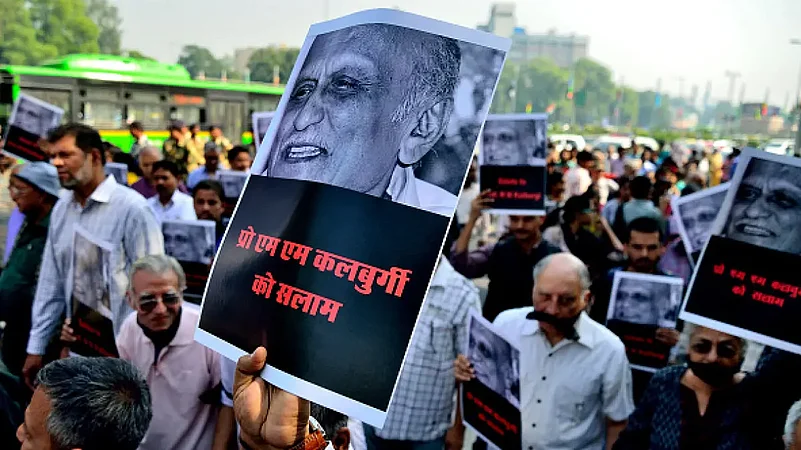Soon after Malleshappa Madivalappa Kalburgi, a noted Kannada writer and former vice chancellor of Kannada University, Hampi, was murdered at his home in 2015, Bhuvith Shetty, a Bajrang Dal leader, tweeted an open threat to rationalists: “Mock Hinduism and die a dog’s death.”
The Price They Pay For Challenging The Republic Of Unreason
Rationalists are under fire for questioning faith, religious extremism, superstitions, communal politics, and flawed interpretation of history while upholding scientific temperament.?

The stabbing of Indian-born British author Salman Rushdie has brought the spotlight back on the uptick in attacks on rationalists and writers in India.
Notably, these writers and thinkers have challenged faith, religious extremism, superstitions, communal politics and flawed interpretation of history while upholding scientific temperament. While the BJP-led government at the Centre chose to maintain a cautious silence over the stabbing incident, many cite arrests of intellectuals and writers in connection with the Bhima-Koregaon case, saying the government is allegedly wary of alternative political narratives.
Just like Kalburgi, many others like Narendra Dabholkar, Govind Pansare and Gauri Lankesh have been killed and threatened by the right-wing extremists in the recent years that have seen a surge in majoritarian politics. Most recently, Kannada writer Devanoor Mahadeva has alleged death threats after he wrote a controversial book on Rashtriya Swayamsevak Sangh (RSS). The award-winning author along 59 other writers and activists has been issued threats. Some written threats have been signed off as ‘Sahishnu Hindu’.?
Similarly, Narendra Nayak, president of the Federation of Indian Rationalist Association, escaped a bid on his life in Mangaluru earlier this year.
The probe in the Gauri Lankesh murder has revealed that it was linked to the murder of Kalburgi, Dabholkar and Pansare. Also, the assassins are alleged to have connections with a right-wing Hindutva outfit, Sanatan Sanstha, which claims to be a spiritual organization and its affiliate the Hindu Janajagruti Samiti.
The slain progressive thinkers and authors mostly wrote in their native languages like Marathi and Kannada. ?“They robustly countered propaganda and fought all attempts to foist just one interpretation of religious texts and perpetuate feudal and dark practices,” reads a preface to ‘The Republic of Reason: Words They Couldn’t Kill’ that has selected writings of Dabholkar, Pansare, Kalburgi and Gauri Lankesh. Brought out by Safdar Hashmi Memorial Trust in association with The Raza Foundation, the book claims to be “an act of reason and rebellion, both.”
Narendra Dabholkar was an anti-superstition activist and Maharashtra’s most vocal rationalist. While on a morning walk, he was shot dead by two motorcycle-borne youth on August 20, 2013. He was 65. Left and secular political parties that spearheaded the protest against his assassination blamed right-wing obscurantist Hindutva forces. According to Ashok Dhawle, a Maharashtra farm leader and president of CPI’s All India Kisan Sabha, Dabholkar was a medical doctor by training and founder president of Maharashtra Andhashraddha Nirmoolan Samiti. He also campaigned for Maharashtra Prevention and Eradication of Human Sacrifice and other Inhuman, Evil and Aghori Practices and Black Magic Act, 2013 and edited the socialist weekly ‘Sadhana ‘ that was set up by Sane Guruji, a strong proponent of ‘Ek Gaon, Ek Panavtha (One Village, One Source of Water)’ campaign against caste discrimination of Dalits. Dabholkar fought against superstitions such as human sacrifice, black magic, witchcraft, ghosts, reincarnation, and superstitious rituals surrounding them.
Veteran CPI leader Govind Pansare was also shot dead when he was out on a morning walk near his home in Kolhapur on November 26, 2015. He was 81. During his action-packed life, he participated in several struggle movements including Goa Liberation Movement, Samyukta Maharashtra Movement, Land to the Tiller Movement. Remarkably, he organized peasants and waged a militant struggle against the Zamindari system. In a later stage of his life, he had become a prolific writer and devoted most of his time to grooming young cadres. Some of the English translations of his work include The Legacy of Shahu Maharaj, Mandal Commission, Backwardness of Muslims and Sachar Commission, Religion Caste and Class, Neo Liberalization and Globalization, Peasant Distress, The Truth of Article 370 and Kashmir Imbroglio and Panchayat Raj among others.?
On the 50th?death anniversary of Gandhi, he wrote an article saying, “The forces that hate other religious faiths and support the ideas of inequality are much stronger today than they were in Gandhi’s time. We, therefore, need to work more. We also need a broader unity and more struggle.”
MM Kalburgi was a strong critic of superstitious practices and right-wing politics, he was also shot dead at his house by two unidentified persons in Kalyan Nagar, on August 30, 2015. He was 77. Known for combining modern sensitivities with tradition, Kalburgi wrote extensively on folk and formal literature. His assassination resulted into a succession of literary figures returning state awards and titles in protest against the rise of majoritarianism. Earlier in March this year, one of the daughters of the Kannada scholar identified the killers of her father during an emotional deposition in a Dharwad court.
Gauri Lankesh, 55, was shot dead in the head and chest on September 5, 2017 on her doorstep in Bengaluru. The gunmen here too had arrived on a motorcycle. A high-profile journalist, Lankesh led vigils against the killing of her friend Kalburgi. She edited the Gauri Lankesh Patrika, a tabloid that grew out of a similar paper, Lankesh Patrika, created by her father and poet P. Lankesh. According to Raghu Karnad, a journalist and Gauri Lankesh’s friend, Gauri returned to Kannada after working in the English press to reach those readers –and never touched the political patronage that wished to reach them through her. Karnad wrote in a moving tribute: “She knew that it was the grassroots and not the elite, that would defy authoritarianism. It was because she spoke with them that she was chosen to be silenced.”?
-
Previous Story
.jpg?auto=format%2Ccompress&fit=max&format=webp&w=376&dpr=2.0) Post-Polls, J&K Assembly To Pass Resolution For Restoring Special Status And Statehood
Post-Polls, J&K Assembly To Pass Resolution For Restoring Special Status And Statehood - Next Story


















